From the failure to rewet peatlands on a large scale to drilling down on Ireland’s nitrates derogation, the European Court of Auditors' (ECA) latest report is scathing in its appraisal of the impact on the Common Agricultural Policy (CAP) on meeting climate targets.
It outlines that 26% of the CAP budget was meant to be directed at climate measures, which was almost 50% of the total EU Climate Action spending, yet emissions had not changed significantly since 2010.
During a briefing with auditors who compiled the report, they outlined particular concerns they had over tackling emissions produced by livestock in Europe.
“Livestock emissions, accounting for half of greenhouse gas emissions from agriculture, including land use emissions and removals from cropland and grassland, did not decrease between 2010 and 2018.
"These emissions are directly linked to the size of the livestock herd, and cattle cause two-thirds of them,” the report stated.
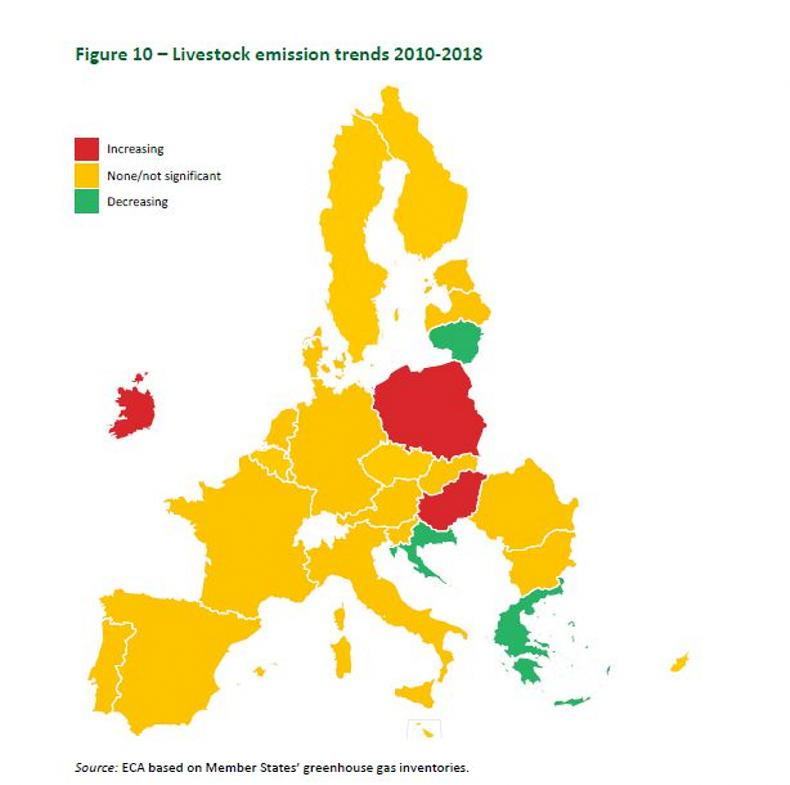
Emissions per country on ECA report.
"For most member states, livestock emissions are unchanged. Only Greece, Croatia and Lithuania showed significant emissions reductions between 2010 and 2018.
"These reductions were mainly associated with large decreases (around 30%) in dairy cow numbers, rather than the results of CAP targeted mitigation policies.
"In these three countries, lack of competitiveness played the key role in the decline. Ireland, Hungary and Poland, on the other hand, have seen substantial emissions increases."
Consumer consumption
However, they outlined concerns that given that consumer consumption was still firmly fixed on a diet that included animal products and beef, it would be unwise to introduce any herd reduction scheme until consumption habits changed.
They explained that this would be because there was a risk of “carbon leakage”, where animal-based food products would be sourced from other countries with poorer climate records than the EU to meet consumption demand if herd sizes were reduced through the next CAP.
Author of the report Vioral Stefan did not hold back in saying that replacing some animal products with vegetable-based ones would be better for the climate.
Auditors mentioned that research into the inclusion of feed additives to reduce methane from cattle was ongoing, but that this research so far only seemed to prove effective in intensive systems.
Equally, the auditors did not seem keen to promote livestock numbers through voluntary coupled schemes that are present in a number of EU countries.
Derogation
Of particular concern to many Irish farmers will be the report’s concentration on nitrates derogations.
“We analysed the information provided by the Irish authorities on derogations under the nitrates directive,” the report said.
“Since 2014, in Ireland, the area under derogation has increased by 34% and the number of animals in farms with derogations grew by 38%.
"In the same period, emissions from chemical fertilisers increased by 20%, emissions from manure applied to soils by 6% and indirect emissions from leaching and run-off by 12%.”
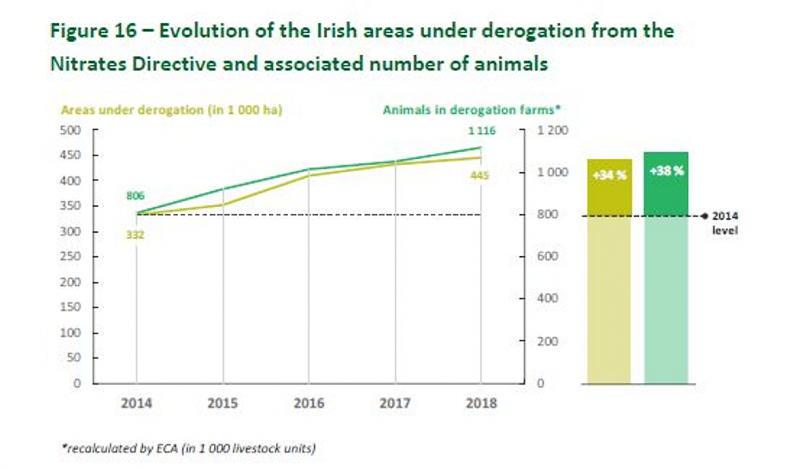
Evolution of the Irish areas under derogation from the nitrates directive and associated number of animals.
It also looked into emissions from manure and fertiliser use.
“In our review of studies, we found no effective practices for reducing greenhouse gas emissions from manure application, other than reducing the amount applied.
"The CAP supports practices that apply manure near or into the soil (eg trailing hose/shoe). Such practices can be effective for reducing ammonia emissions, but they are not effective for reducing greenhouse gas emissions and may even increase them,” it said.
Peatlands
Auditors were very keen to promote the impact rewetting peatlands could have on meeting climate targets and equally keen on ensuring that any farmers farming peatland should be compensated.
They insisted that direct payments should continue to be paid to farmers who rewetted peatlands and that a long-term scheme was needed to encourage farmers to undertake rewetting.
“The potential of restoring peatlands is also acknowledged in a study that found that rewetting just 3% of EU agricultural land would reduce agricultural greenhouse gas emissions by up to 25%,” the report said.
Recommendations
Recommendations from the ECA include:
Invite member states to establish a target for reducing greenhouse gas emissions from their agricultural sectors.Assess member states’ CAP strategic plans in view of limiting the risk that CAP schemes increase or maintain greenhouse gas emissions from agriculture.Ensure the CAP provides effective incentives to reduce greenhouse gas emissions from livestock and fertilisers that contribute to achieving EU climate goals. It also said that the European Commission should assess the impact of peatland rewetting post-2020 and consider introducing a “polluter pays” principle.
This could prove particularly costly for Luxembourg, Denmark and Ireland, who were all in the bottom three in terms of reaching emissions targets set in 2005.
From the failure to rewet peatlands on a large scale to drilling down on Ireland’s nitrates derogation, the European Court of Auditors' (ECA) latest report is scathing in its appraisal of the impact on the Common Agricultural Policy (CAP) on meeting climate targets.
It outlines that 26% of the CAP budget was meant to be directed at climate measures, which was almost 50% of the total EU Climate Action spending, yet emissions had not changed significantly since 2010.
During a briefing with auditors who compiled the report, they outlined particular concerns they had over tackling emissions produced by livestock in Europe.
“Livestock emissions, accounting for half of greenhouse gas emissions from agriculture, including land use emissions and removals from cropland and grassland, did not decrease between 2010 and 2018.
"These emissions are directly linked to the size of the livestock herd, and cattle cause two-thirds of them,” the report stated.

Emissions per country on ECA report.
"For most member states, livestock emissions are unchanged. Only Greece, Croatia and Lithuania showed significant emissions reductions between 2010 and 2018.
"These reductions were mainly associated with large decreases (around 30%) in dairy cow numbers, rather than the results of CAP targeted mitigation policies.
"In these three countries, lack of competitiveness played the key role in the decline. Ireland, Hungary and Poland, on the other hand, have seen substantial emissions increases."
Consumer consumption
However, they outlined concerns that given that consumer consumption was still firmly fixed on a diet that included animal products and beef, it would be unwise to introduce any herd reduction scheme until consumption habits changed.
They explained that this would be because there was a risk of “carbon leakage”, where animal-based food products would be sourced from other countries with poorer climate records than the EU to meet consumption demand if herd sizes were reduced through the next CAP.
Author of the report Vioral Stefan did not hold back in saying that replacing some animal products with vegetable-based ones would be better for the climate.
Auditors mentioned that research into the inclusion of feed additives to reduce methane from cattle was ongoing, but that this research so far only seemed to prove effective in intensive systems.
Equally, the auditors did not seem keen to promote livestock numbers through voluntary coupled schemes that are present in a number of EU countries.
Derogation
Of particular concern to many Irish farmers will be the report’s concentration on nitrates derogations.
“We analysed the information provided by the Irish authorities on derogations under the nitrates directive,” the report said.
“Since 2014, in Ireland, the area under derogation has increased by 34% and the number of animals in farms with derogations grew by 38%.
"In the same period, emissions from chemical fertilisers increased by 20%, emissions from manure applied to soils by 6% and indirect emissions from leaching and run-off by 12%.”

Evolution of the Irish areas under derogation from the nitrates directive and associated number of animals.
It also looked into emissions from manure and fertiliser use.
“In our review of studies, we found no effective practices for reducing greenhouse gas emissions from manure application, other than reducing the amount applied.
"The CAP supports practices that apply manure near or into the soil (eg trailing hose/shoe). Such practices can be effective for reducing ammonia emissions, but they are not effective for reducing greenhouse gas emissions and may even increase them,” it said.
Peatlands
Auditors were very keen to promote the impact rewetting peatlands could have on meeting climate targets and equally keen on ensuring that any farmers farming peatland should be compensated.
They insisted that direct payments should continue to be paid to farmers who rewetted peatlands and that a long-term scheme was needed to encourage farmers to undertake rewetting.
“The potential of restoring peatlands is also acknowledged in a study that found that rewetting just 3% of EU agricultural land would reduce agricultural greenhouse gas emissions by up to 25%,” the report said.
Recommendations
Recommendations from the ECA include:
Invite member states to establish a target for reducing greenhouse gas emissions from their agricultural sectors.Assess member states’ CAP strategic plans in view of limiting the risk that CAP schemes increase or maintain greenhouse gas emissions from agriculture.Ensure the CAP provides effective incentives to reduce greenhouse gas emissions from livestock and fertilisers that contribute to achieving EU climate goals. It also said that the European Commission should assess the impact of peatland rewetting post-2020 and consider introducing a “polluter pays” principle.
This could prove particularly costly for Luxembourg, Denmark and Ireland, who were all in the bottom three in terms of reaching emissions targets set in 2005.





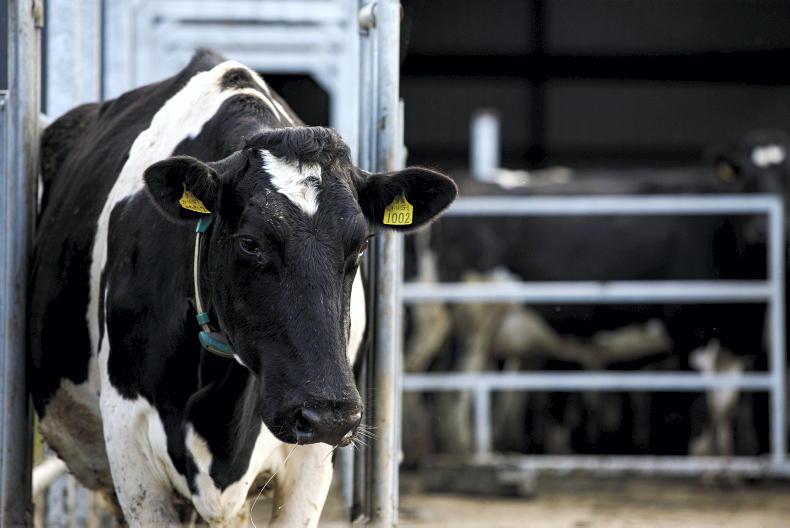

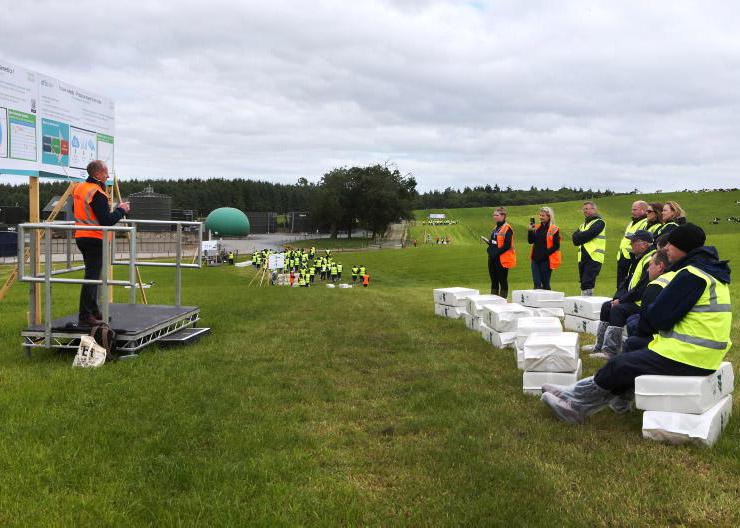


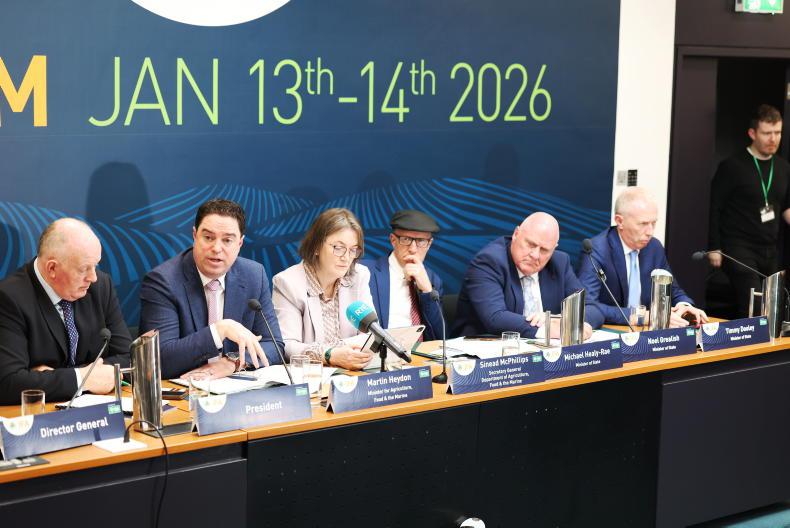

SHARING OPTIONS